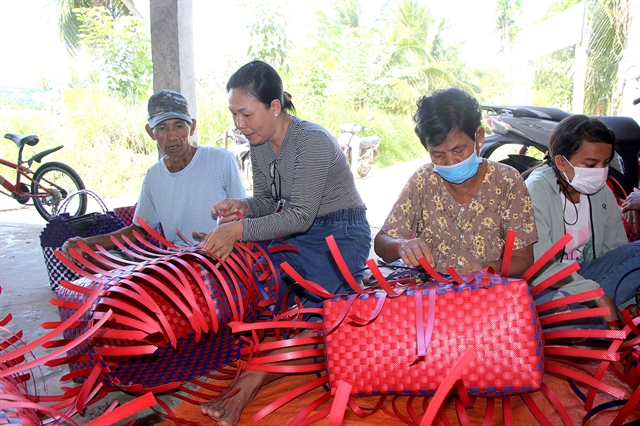 Society
Society

 |
| People learn to weave baskets in Kế Sách District in the Cửu Long (Mekong) Delta province of Sóc Trăng. – VNA/VNS Photo Tuấn Phi |
HCM CITY – Authorities in the Cửu Long (Mekong) Delta are providing vocational training for the workforce to help people find steady jobs and improve their lives.
The delta’s 12 provinces and Cần Thơ city have 75 per cent of their more than 17 million population living in rural areas and mostly working in the agricultural sector.
Sóc Trăng Province has focused on providing vocational training and jobs for rural people in recent years to help them escape poverty.
Nguyễn Phước Hữu in Vĩnh Qưới Commune in the province’s Ngã Năm Town said he has no farmland and attended a short-term vocational training course in weaving handicraft products from water hyacinth.
He started making the products since the end of 2022, and his family escaped poverty and has a better life since then, he said.
Nguyễn Văn Vũ, director of the Ngã Năm Town Vocational Education-Continuing Education Centre, said the three-month vocational training has created jobs for many rural residents and played an important part in mitigating poverty.
The centre organised 32 training courses in handicrafts, aquaculture and industrial sewing for 857 beneficiaries last year, and more than 92 per cent of them have since obtained jobs, he said.
Kim Thái Phong, chairman of the Ngã Năm People’s Committee, said the town has created favourable conditions for public and private vocational training establishments.
It has persuaded agricultural production and services and industrial services businesses to link up with vocational training establishments to create jobs.
Last year Sóc Trăng provided vocational training to 17,540 people and created 29,412 jobs, according to its Department of Labour, Invalids and Social Affairs.
Võ Thanh Quang, its director, said the department aims to train 16,000-18,000 people and create 28,000-30,000 jobs this year.
It will strengthen advocacy to enhance public awareness of vocational education and policies and introduce jobs and improve vocational skills to meet the province’s socio-economic development requirements.
Hậu Giang Province trained 8,400 people last year, 17 per cent higher than its target.
It will continue to provide training to meet the recruitment demands of the market, according to its labour department.
In Cần Thơ, the Sub-department of Rural Development and districts last year organised seven training courses in growing fruits and vegetables for 225 poor and unemployed people.
Dương Ngọc Điền of Bình Thuỷ District’s Trà Nóc Ward, who used to be a worker at the Trà Nóc Industrial Park and lost his job two years ago, attended a course on growing clean vegetables organised by the sub-department last year.
He now rents land to grow vegetables and earns an income of VNĐ200,000 (US$8) a day, he said.
“I participated in the course because I wanted to know how to grow vegetables with high yields and are safe.”
The city provided vocational education to 45,600 people last year, according to its labour department.
Increase skilled labourers
The delta region also aims to increase the rate of its skilled workers.
Trần Thị Xuân Mai, director of the Cần Thơ labour department, said the city plans to increase it from 82.5 per cent now to 83.5 per cent by the end of this year.
It hopes to train 45,000 people and create 50,600 jobs this year, she said further.
It would assess the demand for labour in each sector and create stable jobs through programmes, projects and credit policies, she said.
Nguyễn Hồng Mai, director of the Long An labour department, said the province has trained 67,570 people in the last three years, already meeting 74.7 per cent of its target for 2021-25.
It wants 75 per cent of its workforce trained in vocational skills by the end of the period, she said.
It plans to invest more in vocational training facilities, develop skilled teachers and generally improve the quality of vocational schools, she added. – VNS




